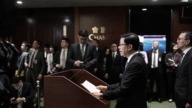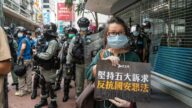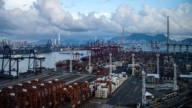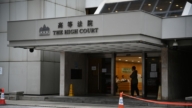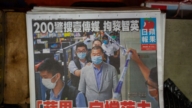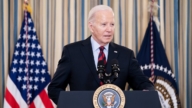【新唐人2015年01月03日訊】英國《路透社》在剛剛過去的2014年12月31號,發表了一份「特別報導」(Special Report)。報導指出,儘管中共無法在政治上馴服香港,但它正加強對香港商界的控制,並正「殖民化」香港經濟,目前中資企業在香港多個關鍵行業佔的比重,越來越大。
《路透社》報導說,最能說明現象的其中一個指標是,大陸企業在香港中環地區的租賃空間。大陸企業目前佔中環地區寫字樓新簽租約的50%以上,這個數據遠高於2012年的20%。而在中環、金鐘、上環和灣仔區的25個甲級寫字樓,中資企業入駐的比例,從2008年的13%上升到今年稍早時的21%。
在88層高的國際金融中心的大堂名牌上,大陸企業也愈來愈多,其中包括2011年成立的國開國際投資有限公司,它是中國開發銀行的離岸投資公司。
此外,大陸企業還大手筆鯨吞香港地皮,《路透》報導指出,在舊機場啟德,去年以來售出的六塊地皮中,兩塊由中國海外發展有限公司購得,一塊由中國的保利置業集團購得。而大陸企業也一直不斷地赴港上市,目前在恆生指數中已佔到54%的比重。
時政評論員伍凡:「 它把全球的人民幣兌換中心設在香港,並且最近又開設滬港通,要把香港的股市和中國大陸的A股連通起來,它的目的是甚麼?要掌控香港。 香港100多年來是一個自由市場,已經有個品牌了,是全世界在遠東最大的股票市場,它要充分利用它, 很多外資到香港來,中共要去佔領這個舞臺。」
美國南卡羅萊納大學艾肯商學院教授謝田指出,中共實際上是透過經濟上的滲透,來達到政治上控制的目的。
美國南卡羅萊納大學艾肯商學院教授謝田:「 這一次香港的學運,我們已經看到了,中資資本的公司在學運中起到的作用,他們在支持那些反對雨傘運動的人,還有中資控股的公司直接在威脅參與雨傘運動的學生民眾, 扼殺港人的自由,這個是中資進入香港最直接的後果。」
《路透社》報導說,幾十年來,香港許多行業一直由商業巨頭主宰,如亞洲首富李嘉誠,賭場大亨呂志和,棕櫚油大亨郭鶴年等,但現在,這些人正在見證大陸企業入侵(invasion)香港這座城市。
伍凡:「 為甚麼李嘉誠在中國大陸的房地產賣了,連香港他的企業、房地產也賣了,他要離開香港了, 那就等於說港人治港是空殼子了,那麼它(中國)大量的移民,這17年來有100多萬移民到香港,並且都是很有錢的人,他們慢慢慢慢代替了香港原來的資本家,由他們來治理香港,這就是10幾年來中共控制香港的一切手段。」
報導還說,北京明確表示,經濟一體化(economic integration)的核心,是加強對香港行使主權,北京的部分願景是將香港拉入珠江三角洲經濟區。而在零售銀行業務方面,中資銀行在香港開設了近500家分支機構,佔全部銀行分支機構總數的40%。
時政評論員伍凡指出,中共從金融、經濟、民生各個方面控制香港,目的是防止香港成為一個反共基地。
伍凡:「 最近這10年來,中共為了把香港老百姓拉住,香港的水是大陸供應的,電也是大陸供應的,還有食品,魚、肉、蛋,幾乎全部是大陸供應的,它等於是佔領了香港的零售市場,這一點就控制香港的社會。它控制香港以後,再建立一個香港、澳門、深圳的經濟區,香港的特色沒有了,香港的自由、民主這些東西慢慢就淡化了。」
《路透》指出,經濟一體化並不總是促進了解,有時反而引發緊張。一個摩擦的來源是,大陸富豪購買香港房地產,推高了房價,令許多香港居民不滿。
謝田:「 可能是抬高了香港的房地產,商業房地產和居民房地產,還有一個,隨著中資企業的進入,很多中國大陸一些不好的管理上的習慣、管理上的風氣,可能也在侵蝕香港的經濟制度和企業型態。我更擔心,大陸普遍的企業造假、欺騙、欺詐行為,慢慢也滲入到香港,那就非常危險。」
謝田表示,針對香港爭取民主運動,中共最大的失策,一是香港民間普遍覺醒,二是警示了台灣,走親中路線的國民黨也因此在最近的九合一選舉中慘敗。
不過,伍凡仍然呼籲台灣朝野不要被中共的金錢、資本所迷惑、所收買,從而喪失了國家的權力。
採訪/易如 田淨 編輯/陳潔 後製/蕭宇
Reuters: The CCP Colonization of Hong Kong’s Economy.
British Reuters published a Special Report on Dec. 31, 2014
which says although the Chinese Communist Party (CCP)
can’t politically tame Hong Kong, it is tightening control over
Hong Kong’s business circle and colonizing the economy.
Chinese enterprises are increasing in numbers in many
key industries in Hong Kong.
The report says one of the most telling signs of change is
how much space mainland Chinese companies lease.
These companies account for over 50% of new leases
signed for offices, which is much higher than the 20% in 2012.
Mainland occupancy of 25 key prime office spaces, in the
districts of Central, Admiralty, Sheung Wan and Wan Chai
increased from 13 percent in 2008 to 21 percent in 2014.
Hong Kong’s 88-floor International Finance Centre has
a growing number of mainland companies on the list;
These include China Development Bank International
Holdings Ltd, opened in 2011.
It’s an offshore investment firm of China Development Bank.
Mainland companies also occupy significant amounts of
Hong Kong’s land.
The Reuters report says three of the six available plots
sold in Kai Tak district went to Chinese firms.
Two went to China Overseas Land & Investment,
and one went to Poly Property Group.
Mainland firms keep on being listed on the
Hong Kong stock market.
They now account for 54 percent of the companies
traded on the Hang Seng Index.
Wu Fan, political commentator, “It (CCP) sets the global
RMB exchange center in Hong Kong.
The CCP recently opened the Shanghai-Hong Kong
Stock Connect, connecting Hong Kong’s stock market
and mainland Chinese A-shares. What’s its purpose?
It’s to control Hong Kong.
Hong Kong has been a free
market for over 100 years.
It has its brand. It’s the biggest stock market
in the Far East.
[The CCP] wants to take full advantage of it.
Lots of foreign investment comes to Hong Kong,
and the CCP wants to occupy this platform.”
Professor Xie Tian at Business School of University of South
Carolina indicated that the CCP tries to control Hong Kong
politically through controlling its economy.
Professor Xie Tian said, “We have seen that the Chinese
companies have had effects on this student movement in
Hong Kong. They have supported the anti-umbrella
movement people.
Chinese holding companies directly threatened students
and citizens participating in the umbrella movement.
The most direct consequence of Chinese companies in
Hong Kong is strangling freedom of Hong Kong people.”
The Reuters report says many Hong Kong industries have
been dominated by business tycoons for decades, such as
Asia’s richest man Li Ka-shing, casino tycoon Lui Che Woo,
and palm oil tycoon Robert Kuok.
But now, these people are witnessing mainland Chinese
enterprises invading Hong Kong.
Wu Fan, “Why did Li Ka-shing sell his properties in mainland
China and his enterprises and properties in Hong Kong?
[It’s because] he’s leaving Hong Kong. It means Hong Kong
people ruling Hong Kong is just an empty shell.
Mainland China has seen over a million immigrants to
Hong Kong in the past 17 years, and they are all rich.
They slowly take the place of Hong Kong’s original
capitalists, and then rule Hong Kong.
This is how the CCP controlled Hong Kong in
the past for over a decade.”
The report also says Beijing has clearly indicated that
the key of economic integration is to enhance sovereignty
over Hong Kong. Beijing’s goal is to include Hong Kong
in the Pearl River Delta Economic Zone.
Chinese banks opened nearly 500 branches in Hong Kong,
accounting for 40% of all branch banks in Hong Kong.
Wu Fan indicated that the purpose of the CCP controlling
Hong Kong in all aspects is to prevent Hong Kong from
becoming an anti-CCP base.
Wu Fan, “In the past 10 years, to control Hong Kong people,
mainland China supplies water, electricity, food including fish,
meat, eggs, and almost everything for Hong Kong. It has
occupied Hong Kong’s retail market, controlling the society.
After [the CCP] controlled Hong Kong, it established a
Hong Kong, Macau, and Shenzhen economic zone.
Hong Kong has lost its features. Freedom and democracy
in Hong Kong is gradually fading.”
The report says economic integration doesn’t always
promote understanding, but sometimes triggers tensions.
One of the sources creating disputes is that rich mainland
Chinese purchase lots of Hong Kong properties.
This is raising the property prices and causing complaints
from many Hong Kong people.
Xie Tian, “It probably raised Hong Kong’s real estate,
business properties and residency properties.
Also, following the entry of Chinese enterprises, many bad
management habits are eroding the economic system and
business patterns in Hong Kong.
I’m worried that the fraud and cheating actions rampant in
mainland China will gradually penetrate into Hong Kong.
That’s very dangerous.”
Xie indicated that the biggest failing of the CCP in the recent
democracy movement in Hong Kong is that it widely awoke
Hong Kong people and it warned Taiwan as well. The Pro-
CCP Nationalist Party also lost in the recent election.
Wu Fan appeals to the Taiwan government not to be
deceived or bought by the CCP’s money and capital;
Not to lose its rights as a nation.
Interview/ YiRu、TianJingEdit/ ChenJie Post-Production/ XiaoYu


